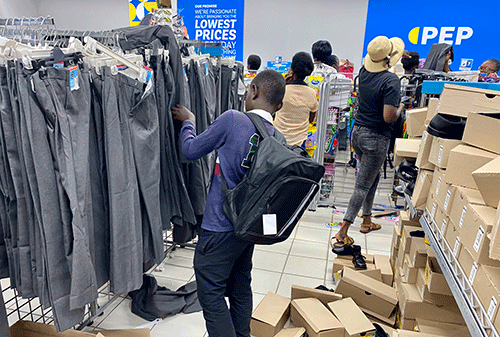Education stakeholders must work around the clock to find solutions to address the myriad of challenges facing the sector, instead of playing a blame game that resolves nothing.
This is the first public statement by President Hage Geingob since the release of the national examination results for grades 11 and 12, which woke the nation from its festive season slumber.
Nearly 80% of the learners who sat for the Namibia Senior Secondary Certificate Ordinary (NSSCO) and the Advanced Subsidiary (AS) levels failed to meet
tertiary education institutions’ entry requirements. Official data released by the education ministry at the end of December indicates there were 38 019 full-time candidates for the 2022 Namibia Senior Secondary Certificate Ordinary at 363 full-time centres.
Of these, a paltry 5 812 scored 25 points or higher, allowing them to enter tertiary education, while 8 133 (21%) qualified for AS level (grade 12) in 2023.
“Geingob has taken note of the worrying outcome of the final results of the NSSCO and NSSCAS examinations as announced by the Ministry of Education, Arts and Culture. In that vein, President Geingob expressed dissatisfaction with the results on 3 January 2023 and informed the nation the minister of education had been requested to provide a report, detailing what had transpired and the reasons for the dismal results,” the Presidency said yesterday.
Geingob, the Presidency added, has listened attentively to all stakeholders who voiced opinions on the issue.
Geingob, as the head of Cabinet, conceded that the ultimate responsibility and accountability to the nation resides with him.
Nghipondoka is expected to submit a comprehensive report to Geingob, regarding what led to the colossal failure.
Holding hands
“In the spirit of holding hands, the necessary decisions and actions will be taken to advance the interests of teachers, learners and the education sector in general,” press secretary Alfredo Hengari added.
As a former teacher, Hengari continued, Geingob is alive and attentive to the needs of teachers and the role they play in the education and wellbeing of the Namibian child.
This includes the betterment of Namibia. “The President has always said it is because of a teacher and education in general that the son of a farmworker becomes the president of a country and the daughter of a domestic worker becomes a medical doctor,” he added, seemingly pointing to Geingob’s humble beginnings.
More so, the former prime minister was unequivocal, saying shifting blame will not resolve the issues confronting the sector.
“The President would like to appeal to all stakeholders, specifically the teachers, the learners, the parents, the ministry of education and the unions to avoid blaming one another for the dismal results, which everyone agrees are not in the interests of the country. Such an approach of blaming one another is not helpful,” further asserts the Presidency.
Hope
All hope, however, is not lost.
“After the report is tabled and the necessary decisions are taken, President Geingob is convinced that as a government, teachers, parents, learners, unions and student organisations, common solutions will be found to avoid a repeat of the dismal results of the 2022 academic year,” optimistically added Hengari.
The Presidency’s position reverberated through the leadership of the Namibia National Students Organisation (Nanso). The student body at a press conference last week branded the embarrassing results a collective failure.
“We must, in no uncertain terms, concede that we are sitting in the middle of a crisis; on top of a pot that, without concerted and serious attention, will boil over. It must never be accepted as normal that of the 38 019 candidates who wrote the NSSCO examinations, only 5 812 qualify to enrol at institutions of higher learning, or that 8 133 qualify to proceed to NSSCAS level,” said Nanso leader Lucia Ndishishi.
From the organisation’s vantage point, blame cannot be apportioned to an individual or institution.
“We wish to recognise that education is not a singular event, nor is it a responsibility of one entity or person. Instead, it is a public good that is guaranteed to all, by all and, thus, a social process that can and, indeed, should not only exist within classrooms but also across a multitude of sites and at unconventional times,” added Ndishishi.
– emumbuu@nepc.com.na


